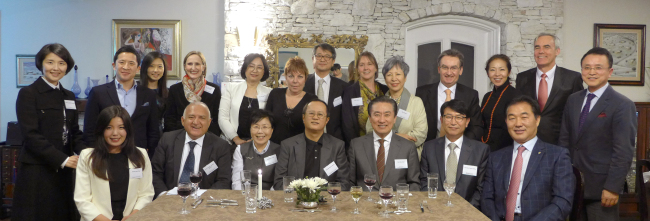The Korean Wave, or hallyu, will continue riding the wave of globalization to export the Korea brand worldwide, a prominent producer speculated, while recommending Koreans find happiness through culture.
Artistic director and former actor Song Seung-whan, who produced the nonverbal musical hit “Nanta,” said Korea’s assimilation of U.S. popular culture gave it a global identity and marketability.
“Through American movies, music and fashion, we were endowed, fortuitously, a universal appeal in our modern identity,” Song said in a lecture at the “Korea CQ” forum at the Turkish embassy residence in Seoul on Tuesday. “Hallyu has spruced up Western ideals with an Asian flavor, creating a cult following in Asia.”
The hallyu boom was created when Korean music companies aggressively entered overseas markets after record sales in Korea plummeted in the late 1990s with the digital transition.
Artistic director and former actor Song Seung-whan, who produced the nonverbal musical hit “Nanta,” said Korea’s assimilation of U.S. popular culture gave it a global identity and marketability.
“Through American movies, music and fashion, we were endowed, fortuitously, a universal appeal in our modern identity,” Song said in a lecture at the “Korea CQ” forum at the Turkish embassy residence in Seoul on Tuesday. “Hallyu has spruced up Western ideals with an Asian flavor, creating a cult following in Asia.”
The hallyu boom was created when Korean music companies aggressively entered overseas markets after record sales in Korea plummeted in the late 1990s with the digital transition.

“When hallyu fans watch Korean dramas and listen to K-pop, they also check out the celebrities’ clothes, cellphones and furniture. It is culture that drives the economy and elevates the Korea brand,” he explained.
Song noted the stock value of AmorePacific cosmetics corporation, which recently surpassed Samsung Electronics.’ The formidable purchasing power of women ― at the heart of hallyu fandom ― is a force to be reckoned with, he said.
The Korean government should spend more on culture and art initiatives -― currently at 0.6 percent of national expenditure -― to get closer to the OECD average of 3 percent, Song said.
The director highlighted that as people’s income rises, happiness becomes one of experiencing life’s diversity, as opposed to obsessing over money.
“When we were poor, our zeitgeist was ‘success.’ We thought that we would be happy after we became successful. But even with a $30,000 income, Koreans are some of the unhappiest people in the world,” Song said. “Our new motto should be ‘happiness.’ We are successful when we become happy.”
A key to earning happiness is by engaging in a rich array of cultural activities, according to Song, who is also a professor at Sungshin Women’s University.
When asked by Park Jae-woo, vice chairman of the Korean Association of Plastic Surgeons, how Korea’s cultural industries can keep up their performance from fast-approaching Chinese competitors, Song said:
“The Chinese companies are not as desperate or dependent on the global market due to the sheer size of the domestic economy. Furthermore, unlike ‘Westernized’ Korea, the Chinese culture maintains a strong national identity, molded by the enclosed imperialist and socialist years.”
Song said it will take many years until Chinese pop culture reaches a worldwide audience. Until then, he added, Korea can go about its business as Asia’s forerunner in the creative industry.
Korea should not regard China solely as a profitable market, Song warned, hinting at the possibility of a top-down boycott campaign. It is wise for both sides to develop a trust-based partnership by mixing Korea’s knowledge and China’s resources, he advised.
Praising Korea’s rich art and music scene, Turkish Ambassador Arslan Hakan Okcal said he participated in a kimchi festival, royal procession and fashion show, where he “paraded the catwalk” in a glossy and colorful hanbok.
Okcal wished more Koreans would open their eyes to Turkish soap operas, like the Turkish youngsters who love K-pop.
“I get lots of emails from 17- and 18-year-olds asking me, ‘Ambassador, what are you doing in Korea, not bringing more K-pop to Turkey?’” he said. “Young Turks love Korean idols’ kinky outfits and hairstyles.”
For hallyu’s sustainable development, “Korean pop-culture must dig deeper and be more original, like the timeless Beatles,” the ambassador said.
The event was organized by the Corea Image Communication Institute, which promotes Korean culture around the world through membership activities.
By Joel Lee (joel@heraldcorp.com)
-
Articles by Korea Herald



![[Exclusive] Korean military set to ban iPhones over 'security' concerns](http://res.heraldm.com/phpwas/restmb_idxmake.php?idx=644&simg=/content/image/2024/04/23/20240423050599_0.jpg&u=20240423183955)




![[Herald Interview] 'Amid aging population, Korea to invite more young professionals from overseas'](http://res.heraldm.com/phpwas/restmb_idxmake.php?idx=644&simg=/content/image/2024/04/24/20240424050844_0.jpg&u=20240424200058)
![[Pressure points] Leggings in public: Fashion statement or social faux pas?](http://res.heraldm.com/phpwas/restmb_idxmake.php?idx=644&simg=/content/image/2024/04/23/20240423050669_0.jpg&u=)










